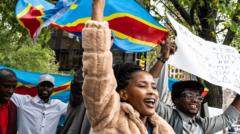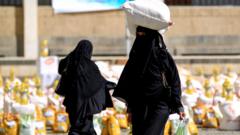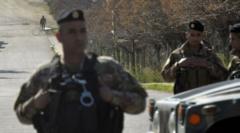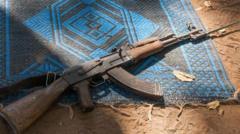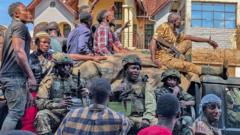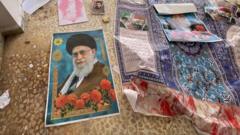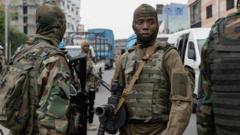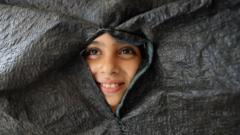Recent offensives by Syrian rebels have led to significant territorial gains against government forces, marking a dramatic shift in an ongoing civil war that has already displaced millions.
Syria Rebels Launch Major Offensive, Capturing Key Territories Amidst Renewed Violence
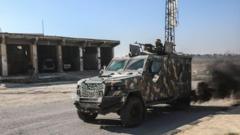
Syria Rebels Launch Major Offensive, Capturing Key Territories Amidst Renewed Violence
Rebels aimed to "deter aggression" from government forces in escalating northwest Syria conflict.
In a notable escalation of the ongoing Syrian conflict, rebel forces have instigated a major offensive in north-western Syria, successfully capturing territory from President Bashar al-Assad's regime for the first time in several years. The offensive, led by the Islamist militant group Hayat Tahrir al-Sham (HTS) alongside allied factions, has seen the seizure of numerous towns and villages in the Aleppo and Idlib provinces since its initiation on Wednesday.
According to rebel officials, the operation was launched as a response to what they termed escalating aggression from the Syrian government and its Iranian-backed militias. The Syrian military, however, has dismissed these claims, asserting that they are confronting a "large-scale" attack from "terrorists" and reporting significant casualties among the rebel forces.
The UK-based Syrian Observatory for Human Rights (SOHR) reported that more than 180 combatants from both sides have lost their lives in the recent fighting, alongside at least 19 civilian casualties due to Syrian and Russian airstrikes on opposition-held areas. This recent surge of violence is particularly concerning given that Idlib represents the last remaining stronghold for opposition forces, housing over four million civilians, many of whom are living in precarious conditions due to ongoing conflict and displacement.
Historically, Idlib has been the epicenter for opposition forces, including HTS as well as Turkish-backed factions operating under the banner of the Syrian National Army (SNA). The region saw a temporary ceasefire established by Turkey and Russia in 2020, aimed at halting government advances. However, sporadic skirmishes, shelling, and airstrikes have continued unabated, with a recent report from the UN special envoy for Syria highlighting how conflicts in neighboring regions, such as Lebanon and Gaza, have exacerbated tensions in northwest Syria.
On Wednesday, HTS announced its plans to deter further aggression from the government, citing an uptick in military actions against northern regions. As the offensive unfolded, rebel forces made significant advances into western Aleppo, reportedly coming within 10 kilometers of Aleppo city. They were said to have captured strategic locations including the Syrian army's 46th Regiment base and vital roadways, including the M5 highway that connects Aleppo with Damascus.
As violence escalated, airstrikes from Syrian and Russian military assets targeted various civilian-populated areas, prompting dire humanitarian consequences. Reports from the International Rescue Committee indicate that nearly 7,000 families have been displaced as a result of hostilities, with health facilities and schools suffering from suspended operations due to the danger.
UN representatives have expressed grave concerns over civilian safety amidst the escalating conflict, urging all warring parties to prioritize the protection of civilians and compliance with humanitarian law. The vulnerability of civilians in conflict zones continues to rise, signaling an urgent need for international intervention and aid to alleviate the humanitarian crisis.
According to rebel officials, the operation was launched as a response to what they termed escalating aggression from the Syrian government and its Iranian-backed militias. The Syrian military, however, has dismissed these claims, asserting that they are confronting a "large-scale" attack from "terrorists" and reporting significant casualties among the rebel forces.
The UK-based Syrian Observatory for Human Rights (SOHR) reported that more than 180 combatants from both sides have lost their lives in the recent fighting, alongside at least 19 civilian casualties due to Syrian and Russian airstrikes on opposition-held areas. This recent surge of violence is particularly concerning given that Idlib represents the last remaining stronghold for opposition forces, housing over four million civilians, many of whom are living in precarious conditions due to ongoing conflict and displacement.
Historically, Idlib has been the epicenter for opposition forces, including HTS as well as Turkish-backed factions operating under the banner of the Syrian National Army (SNA). The region saw a temporary ceasefire established by Turkey and Russia in 2020, aimed at halting government advances. However, sporadic skirmishes, shelling, and airstrikes have continued unabated, with a recent report from the UN special envoy for Syria highlighting how conflicts in neighboring regions, such as Lebanon and Gaza, have exacerbated tensions in northwest Syria.
On Wednesday, HTS announced its plans to deter further aggression from the government, citing an uptick in military actions against northern regions. As the offensive unfolded, rebel forces made significant advances into western Aleppo, reportedly coming within 10 kilometers of Aleppo city. They were said to have captured strategic locations including the Syrian army's 46th Regiment base and vital roadways, including the M5 highway that connects Aleppo with Damascus.
As violence escalated, airstrikes from Syrian and Russian military assets targeted various civilian-populated areas, prompting dire humanitarian consequences. Reports from the International Rescue Committee indicate that nearly 7,000 families have been displaced as a result of hostilities, with health facilities and schools suffering from suspended operations due to the danger.
UN representatives have expressed grave concerns over civilian safety amidst the escalating conflict, urging all warring parties to prioritize the protection of civilians and compliance with humanitarian law. The vulnerability of civilians in conflict zones continues to rise, signaling an urgent need for international intervention and aid to alleviate the humanitarian crisis.

